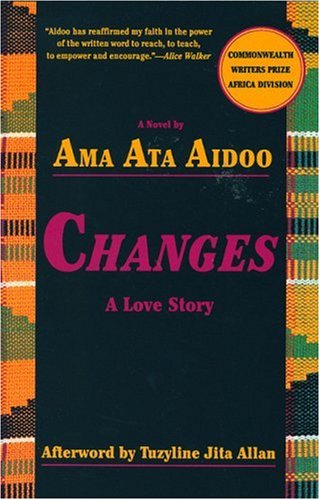Changes: A Love Story

|
Author: Ama Ata Aidoo Price: $ 11.51 (new) $ 6.89 (used) Medium: Paperback (208 pages) Publisher: The Feminist Press at CUNY 1993-11-01 |
Editorial Description
Changes explores the complex world in which the lives of professional working women have changed sharply, but the cultural assumptions of men's lives have not. Witty and compelling, Aidoo's novel, according to Manthia Diawara, "inaugurates a new realist style in African literature." "Aidoo writes with intense power in a novel that, in examining the role of women in modern African society, also sheds light on women's problems around the globe."-Publishers Weekly (starred review)Suggested for course use in:African literatureAfrican studiesFamily StudiesAma Ata Aidoo, one of Ghana's most distinguished writers, is the author of two other works of fiction, Our Sister Killjoy and No Sweetness Here (The Feminist Press), as well as plays, poems, and children's books. Tuzyline Jita Allan is associate professor of English at Baruch College, CUNY.Reader Reviews
One of the best books I've ever read!I read this book in two days! This was a love story but much more. It was a well-written, fascinating book with an ending that I could'nt have predicted. I read somewhere that Ata Ama Aidoo was hesitant to write a love story, well I'm glad she did. I've recommended it to all of my friends!
 wow!
wow!"...that is why we do the serious business of living with our heads, and never our hearts"
Ama Ata Aidoo's second novel is the story of a woman discovering herself - trying unsuccessfully to balance her need for independence with her need for attention and love within the 'constraints' of Ghanaian culture.
What she finds is that Ghanaian culture is wise; "Esi, why do you think they took so much trouble with a girl on her wedding day?... She was made much of, because the whole ceremony was a funeral of the self that could have been."
Changes - the love story Ama Ata Aidoo professed she would never write - conveys the clutter of the zongo, the frustrations of working life in Accra, and the disillusionment of love. Peppered with the uncanny wisecracks of African culture: on love; "when we have to count pennies for food for our stomachs... love is nothing", on hypocrisy; "How can anyone go about, eating the heads of cows, and still maintain that he is afraid of eyes?"; Changes is a delightful trance. One of those pleasures that is indefinable but defining.
It is written without fuss in the language that Ghanaians call English - adapted to suit the whims and imaginings of the local mind. Ama Ata Aidoo flows with ease, occasionally returning (for effect) to the drama format with which she is unquestionably comfortable.
Read this or weep! Ghanian women and Modernity: Independence?
Ghanian women and Modernity: Independence?
Modern Ghanaian women suffer daily sacrifices, lifelong barriers to their advancement, and an emerging modernity which has multiplied their duties but not simplified their lives. Changes focuses on a three year period in the lives of Esi Sekyi, Opokuya Dakwa, and Fusena Kondey, three women approaching their mid thirties in Accra, Ghana.
In Changes we can see the evidence of a complex struggle in the name of modernity between African women and society, families, traditions, and their own desires. From the perspectives of Esi, Opokuya, and Fusena, Aidoo shows us how such modern African women view their lives, and with what methods they are willing to fight to improve their lives.
Esi, Opokuya, and to a lesser degree the much-suppressed Fusena, fight against more than just an accumulation of oppressive tradition that favors men. They struggle for appreciation of their talents and for an equal part in guiding their marriages. Esi and Opokuya struggle to build marriages and relationships that allow them to reap their benefits of their individuality and their educations, and exercise their own free wills, without making them overworked, or being labeled mad women and witches. The reaction of their families, husbands and communities to these women reveal modern dilemmas for educated African women.
Aidoo's love story traces Esi's distinctly rebellious and independent path to love and marriage, as contrasted to the more traditional married lives of Opokuya and Fusena.; in doing so, the novel illustrates women challenging a postcolonial African society on all fronts. This front is as diverse as the workplace, in hotel bars, in the kitchen, on the road driving alone in their new cars, in the rural traditional village, and in the bedroom. Despite often finding that lonely independence is untenable, Esi and Opokuya achieve moderate success in their fight. Their resiliency indicates shifting gender roles in Africa, and some compatibility between tradition and these new roles.
I give this book 5 stars because ot is an extremely rich story told frankly and believably. The material even seems politically important (perhaps all novels should try to be so?) in that it addresses real problems facing Africa and does not always provide answers, although it certainly proveds a rich cast of characters attempting to do so.
